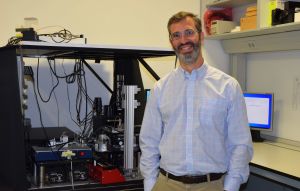Durante los últimos diez años el grupo ha realizado contribuciones importantes en el campo de la biofísica molecular. Por ejemplo, trabajos recientes del grupo de Moreno-Herrero han permitido observar por primera vez el proceso de difusión de la proteína ParB a lo largo del ADN y su unión específica a secuencias parS. También en dos trabajos recientes del grupo se ha descrito el papel de la proteína humana APLF en el proceso de reparación de ADN por unión de extremos no homólogos y que la proteína humana HELB se mueve a lo largo de ADN de hebra sencilla desplazando RPA, otra proteína clave en recombinación de ADN.
Moreno-Herrero ha dirigido diversos proyectos europeos financiados mediante los prestigiosos programas Starting Grant o Consolidator Grant del Consejo Europeo de Investigación (European Research Council). Su excelente investigación se refleja en la publicación de más de 100 artículos científicos en revistas internacionales de alto impacto como Nature, Molecular Cell, Nucleic Acids Research, The Proceedings of the National Academy of Sciences of the USA y Physical Review Letters entre otras.
El impacto de su investigación ha sido reconocido con anterioridad, desde el año 2012 con el Premio Izasa-Werfen de la Sociedad Española de Bioquímica y Biología Molecular (SEBBM), el Premio SBE-40 "Pérez-Payá" de la Sociedad Española de Biofísica (SBE) recibido en 2014 y con el Premio de Investigación de la Comunidad de Madrid "Miguel Catalán" para investigadores menores de 40 años en 2016.
Sociedad de Biofísica de España
La Sociedad de Biofísica de España (SBE) se fundó en 1986 y tiene como principal objetivo favorecer el contacto entre los biofísicos que trabajan en España y entre estos y la comunidad biofísica internacional. Para cumplir estos objetivos la SBE organiza cada año una Reunión científica nacional, financiando la asistencia de jóvenes miembros a este Congreso o a otras reuniones nacionales organizadas por miembros de la SBE. La SBE es miembro de la Asociación Europea de Sociedades de Biofísica y la Federación Latinoamericana de Sociedades de Biofísica, apoyando así la difusión de la Biofísica tanto en Europa como en América.
La SBE concede anualmente premios para reconocer la excelencia en el campo de la Biofísica en las tres categorías siguientes: Premio Antalgenics -SBE 33-, para investigadores de hasta 33 años que realicen contribuciones a la biofísica en España o en el extranjero; el Premio E Pérez-Payá -SBE 40- que reconoce la trayectoria de jóvenes hasta 40 años con una especial contribución al progreso de la Biofísica en España, y el Premio Manuel Rico - Bruker que reconoce una destacada trayectoria en Biofísica durante los últimos 10 años, realizada principalmente en España.
En esta ocasión, el Premio Manuel Rico ha sido concedido de manera conjunta al investigador del CNB Fernando Moreno-Herrero y a Teresa Giráldez Fernández, profesora de la Universidad de la Laguna (Tenerife) por “sus notables contribuciones al avance del estudio de los canales iónicos y el desarrollo de técnicas biofísicas para desentrañar los mecanismos de acción de dichos canales y sus implicaciones fisiológicas".
Los galardonados pronunciarán una conferencia en el “XVII International Congress of the SBE” que se celebrará en Castelldefels (Barcelona) del 27 al 30 de junio de 2023, al final de la cual les será entregado el premio y una placa conmemorativa.






